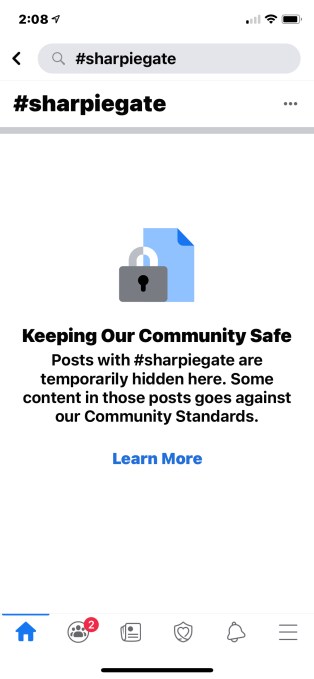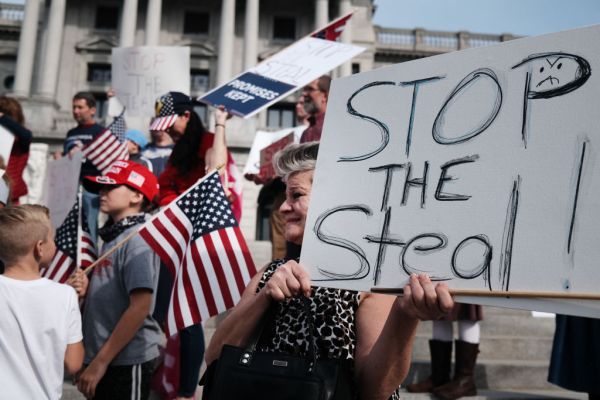Facebook today began to block select hashtags that were being used to share misinformation related to the 2020 U.S. presidential election.
Now, searches for the hashtags #sharpiegate are being blocked on the social network. Another election conspiracy hashtag #stopthesteal is also blocked on Facebook, with a note saying some of its content goes against the platform’s community standards. The #stopthesteal hashtag has been promoted by Donald Trump Jr. and other Trump campaign associates on Twitter.
Instead of taking users to search results for the hashtag in question, Facebook presents a page where it explains that posts with the hashtag are being “temporarily hidden.” This message also explains that “some content in those posts goes against our Community Standards,” and offers to direct users to its guidelines under a “Learn More” link.

Image Credits: Facebook screenshot via TechCrunch
Though TechCrunch found select election misinformation hashtags had been banned, there were still many others that would direct users to content that pushed conspiracies disputing the election results or outright calling them fraudulent.
For example, hashtags like #RiggedElection, #Rigged, #ElectionFraud, #ElectionMeddling and others still worked, and even directed users to content associated with QAnon conspiracies, at times — despite Facebook’s earlier ban on QAnon content, which extended to many associated hashtags.
Given that Facebook allowed QAnon content to spread for years, it’s notable that the company moved to block election misinformation hashtags in a matter of days. That indicates Facebook is capable of addressing viral misinformation somewhat quickly — it just has historically chosen not to do so.
As for the hashtags themselves, SharpieGate had already been thoroughly debunked, both by news outlets and election officials. In a letter posted to Twitter, the Maricopa County Board of Supervisors debunked the claims that the use of Sharpies would invalidate ballots. Because the ballots are printed with offset columns, the use of Sharpies is allowed and would not cause bleed-through or other issues.
The claim was first made Tuesday in a video posted to Facebook in which a woman claims poll workers were encouraging some voters to use Sharpies in order to invalidate their ballots. That video is now flagged on Facebook with a “false information” label and requires users to click through to watch it.
In addition to its hashtag bans, Facebook today also removed a group, “Stop the Steal 2020,” BuzzFeed’s Ryan Mac first reported. The group was tied to real-world protests by Trump supporters, which have erupted around the country as key states continue to tally votes. Some protesters, inspired by misinformation, have even swarmed voting sites where counting is still underway.
“In line with the exceptional measures that we are taking during this period of heightened tension, we have removed the Group ‘Stop the Steal,’ which was creating real-world events,” Facebook spokesperson Andy Stone told TechCrunch. “The group was organized around the delegitimization of the election process, and we saw worrying calls for violence from some members of the group.”
Social media election takedowns
- Facebook takes down ‘Stop the Steal 2020’ group organizing around false claims of election chicanery
- TikTok takes down some hashtags related to election misinformation, leaves others
- TikTok takes down election misinformation aimed at younger users
- Facebook and Instagram notifications warn US users there’s no winner yet in presidential election
- Twitter restricts Trump’s tweet claiming that foes would ‘steal’ the election
- YouTube removes ads from, but won’t pull, ‘Trump Won’ video following backlash
- Twitter hides Trump tweet attacking Supreme Court’s decision on Pennsylvania ballots
As he has signaled he would for months, President Trump is leaning heavily into a false narrative that suspicious polling place behavior and late-arriving ballots are part of a Democratic plot to thwart his reelection chances. In a speech from the White House early Wednesday morning, Trump declared premature victory, raising baseless concerns that mail-in ballots, which were expected to lean heavily Democratic, were somehow improper as they erased some of his early gains. “We were getting ready to win this election,” Trump said. “Frankly, we did win this election.”
On Twitter, many of Trump’s recent tweets promoting unfounded election conspiracies have been hidden from view and placed behind a misinformation warning. Those hidden tweets also have likes, retweets and comments restricted in order to limit their ability to spread in a viral way. On Facebook, the president’s posts alleging fraud at voting sites are not called out directly as misinformation. Instead, Facebook pairs them with informational labels reminding users that vote-by-mail ballots are trustworthy or noting that election officials follow “strict rules” around processing and counting ballots. The company also disabled the “recent” page for Instagram hashtags in the lead-up to the election, a precaution designed to limit the spread of viral election misinformation.
Facebook so far has not responded to a request for comment about its new hashtag bans, but they’re observable within the Facebook app on both the desktop and mobile app as of the time of writing.

